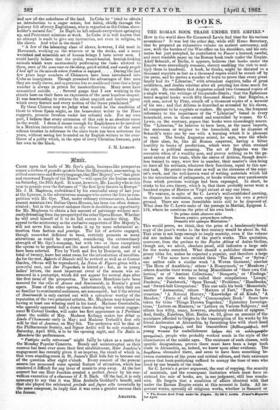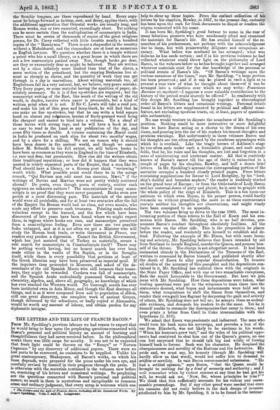BOOKS.
THE ROMAN BOOK TRADE UNDER THE EMPIRE.* How in the world does Sir Cornewall Lewis find time for his various avocations ? It was but the other day, while still Home Secretary, that he prepared an exhaustive volume on ancient astronomy, and now, with the burden of the War-office on his shoulders, and his esti- mates but just accepted, he contributes to Fraser a learned, careful, and most readable paper on the Roman book trade under the Empire. Adolf Schmidt, of Berlin, it appears, believes that books under the Empire were exceedingly common, slavery enabling the rich to mul- tiply them in hundreds. A book, he thinks, might be dictated to a thousand copyists as fast as a thousand copies could be struck off by the press, and he quotes a number of texts to prove that every great family had its "Libraries," with attendant copyists, talks of great publishers, and doubts whether after all printing has done much for the rich. He recollects that Augustus seized two thousand copies of a single work, the writings of the pseudo-Sibyls ; that the Ephesians burnt magical books worth fifty thousand denarii; that Regulus, a rich man, noted by Pliny, struck off a thousand copies of a memoir of his son ; and that /Wiens is described as attended by his slaves, all competent-to be copyists or readers. He quotes, too, the frequent references to the importance of the "Librarian" found in every household, even in those owned and controlled by women. Sir C. Lewis, on the contrary, argues that books were exceedingly scarce. The "Libraries," he believes to have been, as the name imports, the scalesman or weigher to the household, and he disposes of Schmidt's texts one by one with a learning which it is pleasant to read. The books Augustus seized, he says, were the whole of their class, he, like all Roman emperors, having a bitter hostility to books of predictions, which were too often strained to bear a political meaning. The act of Regulus was the eccentric whim of a wealthy man, and proves nothing as to the ge- neral extent of the trade, while the slaves of Atticus, though doubt- less trained to copy, were few in number, their master's idea being to have all his servants, whatever their functions, equal to this spe- cial task. He points to the cost as well as the slowness of the copy- ist's work, and the well-known want of writing materials which led to the introduction of palimpsests, or books written over parchments from which previous writings had been expunged. In short, he sticks to his own theory, which is, that there probably never were a hundred copies of Horace or Virgil extant at any one time. We venture, in spite of Sir C. Lewis's well-established iearning, to dispute his conclusion, more especially upon his own a priori ground. There are some formidable texts still to be disposed of. What does Sir C. Lewis make of the passage in Martial, Epigram I. 118, where he mentions the price of his own book:
"De printo debit altercrve nido Basum pumice, pm-puraque cultum, Denariis tibi quinque Martialem."
This would prove, we think, that the price of a handsomely-bound copy of the poet's works in the first century would be about 3s. 6d. That price is not large enough to imply scarcity, even if the volume did not include the whole of the poet's works. This quotation, moreover, from the preface to the Nodes Attica of Aulus Gellius, though not, we admit, absolute proof, still indicates a large sale for the works recorded. What should a publisher choose catch- penny titles for, unless he expected a popular, and therefore a large sale "For some have entitled them 'The Muses,' or Sylvie ;' one author calls a similar work A Woven Garment,' another The Horn of Araaltheia ;' others A Honeycomb,' or Meadows ;' others describe their works as being Miscellanies of their own Col- lection,' or of Ancient Collections," Bouquets,' or Findings.' There are those who have called their compilations 'Lamps,' Pandects," Patchwork," Spun Thread," Problems," Handbooks,' and Sword-belt Companions.' This one calls his book 'Memorials,' another Accessories,' others Matters of Fact," Facts for In- struction,' Natural History," Knowledge of all Kinds," A Meadow,' Facts of all Sorts," Commonplace Book.' Some have taken for titles Things Thrown Together," Epistolary Investiga-
tions,' on Manners,' or 'Letters on Various Subjects ;' and others less witty, many, however, absolutely redolent of epigram." And, finally, Eusebius, Hint. Eccles. vi. 23, gives an account of the assistance afforded to Origen in the transcription of his works by his friend Ambrosius at Alexandria, by furnishing him with short-hand writers (roxevadriaa), and fair transcribers (thjAwyp4cfm4), and young women for embellishment (adpai &i rb aAaypav qcrvip.ivai), people who probably worked much in the style of the illuminators of the middle ages. The existence of such classes, with specific designations, proves there must have been a large book trade in Alexandria, as, indeed, we know upon other evidence. The atopNrrin abounded there, and seem to have been something be- tween correctors of the press and critical editors, and their existence proves that book-publishing sufficed to occupy the time of men who lived by one branch of the trade. Sir C. Lewis's a priori argument, the cost of copying, the scarcity of materials, and the consequent limitation which must have re- stricted the sale of books, are, in our judgment, still less conclu- sive. He forgets that a condition of affairs identical with that under the Boman Empire exists at this moment in India. All im- portant works, specially all religious works, whether in Sanscrit or • The Boman Book Trade under the Empire. By Sir C. Lewis. Fraser', Magazine for April. the Semitic tongues, are there reproduced by hand. Every argu- ment he brings forward as to time, cost, and decay, applies there, with the additional aggravation that Oriental works are usually long, and Roman works, one or two excepted, exceedingly short. Yet nothing can be more certain than the multiplication of manuscripts in India. There must be scores of thousands of copies of the great religious poems, for Dr. Carey collected with little trouble nearly a hundred copies of the " Ramaytma." There is not a rhapsodist in the country without a Mahabliarut, and the rhapsodists are at least as numerous as English lawyers. We question whether there is a temple without a priest who has a small library, or a great house in which there are not a few manuscripts packed away. Nor, though hooks jun dear, are they so excessively dear as might be believed. They are written out by a class infinitely more limited than that of the slaves, a mere section of the priesthood, but the copying Brahmins live al. most as cheaply as slaves, and the quantity of work they can get through in a day is marvellous. About writ* materials too, all Englishmen fall in a very natural, but, we believe, very grave mistake. They fancy paper, or some material having the qualities of paper, ab- solutely necessary. So it is if fine up-strokes are required; but the manuscript writing of the Bast, like much of the wnting of the old world, is duplex, cursive when paper is procurable, but a kind of written print when it is not. If Sir C. Lewis will take a reed pen, and make his ink of thin gum and lamp-black, he will find that he can make no fine up-strokes, but that he can write a bold square hand on almost any sukstance, lamina of finely-grained wood being the cheapest and easiest to bind into a volume. Tie a sheaf Of these leaves with strong tape, and he will have a book at least as easy to read in the hand as any publication of the day, and some fifty times as durable. A volume containing the Aneid could in India be produced on such slips for about two months' wages, and by a slave for a shilling. We see no reason why it should have been dearer in the ancient world, and though we cannot follow M. Schmidt to his full extent, we still believe books to have been as common as they were in England in the time of Elizabeth, i.e. rare and dear, but procurable. How else did the writers obtain their traditional reputation; or how did it happen that they were quoted in widely separated parts of the Empire, that a man like St. Paul should have a library, or a Roman poet think "reviewing" worth while. What possible point could there be in the savage remark, "Qui Barium non odit amet tua carmina, Mtevi," if the writings of Bavius and Maevius were not pretty widely scattered abroad? Do poets, even though poets of society, scatter such epigrams on unknown authors ? The non-existence of many manu- scripts is no proof that they were never prepared. Books even now perish at a most distressing pace. The materials of the ancient world were all perishable, and for at least two centuries after the fall of the Empire the Roman world had no class, not even monks, who made any effort to preserve such treasures. Printing made codices valueless except to the learned, and the few which have been discovered of late years have been found where we might expect them, in regions where books are rare, and manuscripts preserved from a semi-religious feeling. Even now there are two possible lodes untapped, and as it is not often we get a Minister who will study the Roman book trade, or write thereanent in Fraser, our readers may pardon a digression. Cannot the British Government, w inch has just assisted that of Turkey so materially, secure a real search for manuscripts in Constantinople itself? There may be nothing worth having, but no honest search has ever been made either in the vaults of Sta Sophia, or in the Seraglio itself, while there is every possibility that portions at least of the Greek libraries may have been preserved as imperial spoil. If the inquirers then proceeded to Morocco, and asked of the de- scendants of the old Spanish Moors who still treasure their house- keys, they might be rewarded. Cordova was full of manuscripts, and the Spanish Arabs undoubtedly possessed Greek works on chemistry, algebra, and, above all, geography, no knowledge of which has ever reached the Western world. No thorough search has ever been instituted even in Asia Minor, and though the East destroys all things, and is as it were composed from soil to population of debt-is, still one great discovery, one complete work of ancient Greece, though deformed by the schoolmen, or badly copied at Alexandria, would be worth any amount of labour, and obtain pardon for any diplomatic intrigue.































 Previous page
Previous page